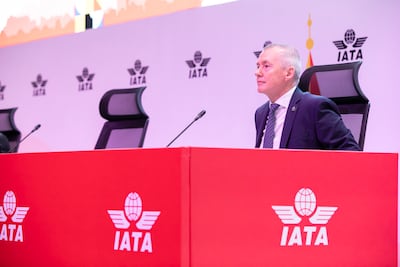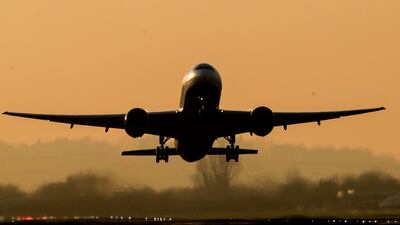The global airline industry landed a strong rise in passenger numbers in June, according to figures released by the International Air Transport Association (Iata) on Wednesday.
Total demand, which is measured as revenue passenger kilometres (RPK), was up 9.1 per cent in the month, compared with June last year.
Total capacity, measured in available seat kilometres (ASK), was up 8.5 per cent compared to June 2023 and the load factor was at 85 per cent, which was 0.5 per cent higher than last June. The load factor is basically the percentage of seats that are taken up by passengers on a flight.
Airlines in the Middle East saw a 9.6 per cent increase in demand, with a load factor of 79.7 per cent, almost exactly where it was last June.
Demand for international travel in general, as measured by RPK, was 12.3 per cent higher than in June last year, as passengers looked to go beyond their national borders for holidays at the start of the busy northern hemisphere summer season.
“Operating with such high load factors is both good and challenging,” said Willie Walsh, Iata’s director general.
“It makes it even more important for all the stakeholders to operate with equal levels of efficiency to minimise delays and get travellers to their destinations on schedule.”

Meanwhile, demand within the large domestic markets also held up well, except in Australia and Japan, where the RPK readings were 1 per cent and 0.2 per cent lower than last year respectively.
Nonetheless, demand in the US, which accounts for 15 per cent of the domestic total, was 5.1 per cent higher and in China demand grew by 5.5 per cent in June this year compared to last year.
Mr Walsh also pointed to the Olympic Games in Paris and the “pride” that the airline industry has “by bringing many of the athletes, fans, and officials together”.
“It is a great reminder of how aviation transforms our very big world into a global community,” he said.
“We wish France every success as the host of the games and cheer all the athletes who will demonstrate the best of human endeavour over the next weeks.”
Cargo surges
Alongside the passenger numbers, Iata also released figures for cargo, which showed a 14.1 per cent increase in total demand in June, the seventh month in a row that cargo demand has shown double-digit growth.
Middle Eastern carriers saw year-on-year demand for cargo in June grow by 13.8 per cent, while Asia-Pacific airlines witnessed a 17 per cent rise in demand.
Growth in demand for air cargo was weakest in the North American market, at 9.5 per cent, while it was at 16.1 per cent for European carriers.
Airlines have benefitted from the problems in the shipping industry related to the tensions in the Red Sea, as well as the huge increase in products in international transit as a result of the continuing expansion of e-commerce, Mr Walsh said.
“Meanwhile, the sector has remained largely impervious to ongoing political and economic challenges, and the US customs crackdown on e-commerce deliveries from China.
“Air cargo looks to be on solid ground to continue its strong performance into the second half of 2024,” he added.


